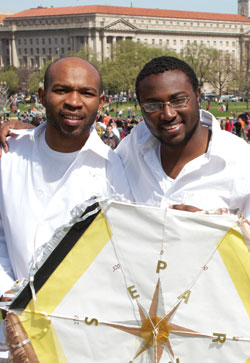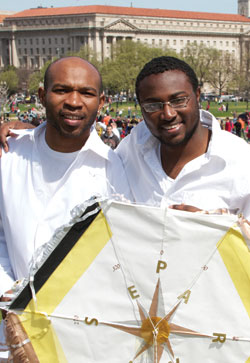How does a student 1,500 miles from home cope when disaster strikes? How does he offer help and hope across an ocean?
Huguens Jean ’12, Ph.D., electrical engineering, flew to Haiti in March 2010 to find Port-au-Prince still reeling from a devastating earthquake. The streets surrounding his childhood home felt foreign and distorted – unusually silent, filled with unfamiliar smells and crumbling buildings.
The earthquake struck in January, during the final days of his grandfather Andre Torchon’s battle with cancer. Travel to Port-au-Prince for the funeral became impossible. Two months later Jean was able to fly to Haiti with his brother, Clifford Muse ’11, information systems. Unable to fulfill their grandfather’s last request that they dress in white at his funeral to celebrate life’s joys, the brothers resolved to honor his memory in another way. They would capture on film the joys of life in Haiti, joys that endured even at a moment of profound national suffering.
The documentary Lift Up, co-directed by Jean and Phillip Knowlton ’03, visual arts, records their journey. It follows Jean and Muse as they build a kite in their grandfather’s honor, just like the kites they had flown with him as children in Haiti. A deeper look reveals Knowlton and Jean’s own journey as filmmakers, each traveling through uncharted territory to share stories of resilience in the face of profound loss with eloquence and compassion.
Jean and Knowlton met as undergraduates at UMBC when they co-captained the track and field team. They came from different worlds—the engineer from Port-au-Prince and the artist from Silver Spring, MD—but they stayed connected through their love of film, even as Jean moved on to graduate school at UMBC and Knowlton to edit music videos in New York. When the earthquake struck, their connection led to collaboration.
“We wanted to help the folks of Haiti in a way that was more meaningful than just texting money,” says Jean. “As a Haitian, it was very difficult for me to watch the devastation from a distance.” When the opportunity arose, they bridged that distance, flying to Haiti to film the post-quake recovery experience, checking their preconceptions at the gate.
The Port-au-Prince that Jean and Muse found was markedly different from the one they had left. The sense of disconnection was jarring in a different way for Knowlton, who had never before been to Haiti. Like Jean, he looked to Haitians for guidance to understand and document their experiences of survival, mourning, endurance and revival.
Jean recalls Knowlton speaking with the local residents, telling them how their strength of spirit amazed him. “To watch them sing, dance and continue with life in the midst of the devastation touched him profoundly,” says Jean, who was moved to tears as he filmed the conversations. “My friend from Maryland was in Haiti, in the middle of the rubble, helping us capture on film this very personal journey, and he did it just because he believed in our vision. I was grateful and humbled by his presence, and I cherished every bit of his collaboration and friendship.”
The result is a film that speaks to the universal importance of community in times of hardship. Lift Up contests negative representations of Haiti that the filmmakers argue have too often dominated media narratives. It also seeks to keep Haiti’s post-quake recovery in the public eye and promote longer-term humanitarian assistance there as news coverage wanes.
Lift Up reflects the vision and passion of the filmmakers as much as the experiences of its subjects. In film, Knowlton sa
Tags: 2010 Haiti earthquake, Clifford Muse, François Duvalier, Government, Huguens Jean, International Organization for Migration, Phillip Knowlton, Port-au-Prince, Summer 2011, Sweet Micky


